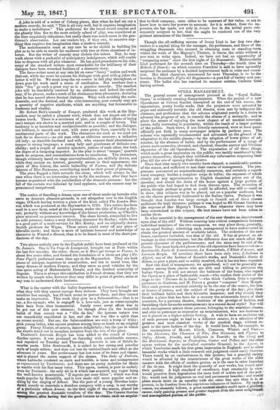A joke is told of a writer of Coburg pieces,
that when he had sat out a modern comedy, he said, " This is all very well, but it requires imagination to make a melodrame." This preference for the broad-sword combat and the ghastly blue fire to the more orderly school of play, was considered at the time exquisitely ridiculous; but really there was much sense in the gen- tleman's observation. Let our readers try, if they can, to conceive any- thing that requires less imagination than a modern comedy. The melodramatist must at any rate be so far skilled in building his plot as to be able to startle his audience with two or three situations of in- terest. But the writer of comedy may disdain this talent. Nay, he may walk about with a pocketful of anticipatory indulgences, which will enable him to dispense with all plot whatever. He has good precedents on his side; many of the standard writers most remarkable for the brilliancy of their dialogue have been wretched builders of a dramatic story.
The farce-writer must at any rate hit on some "funny " notion and work that out, while the more he seasons his dialogue with good telling jokes the better it will be. We must keep the via cornice in full play throughout, or down goes his work amid a storm of retribution. But nowhere does a little " fun " go such a great way as in a genuine comedy. The smallest joke will be thankfully received by an audience; and indeed the author may, if he pleases, make a merit of his abstinence from pleasantry, declaring that he has soared above farcical dialogue. What with avoiding the melo- dramatic, and the farcical, and the over-interesting, poor comedy may get a quantity of negative attributes, which are anything but favourable to freshness and vitality.
Mr. Robert Bell's comedy of Temper, produced this week at the Hay- market, may be called a pleasant work, which does not depart out of the beaten track. There is a minimum of plot; and the bad effects of losing one's temper are shown in a married pair, and in a couple of lovers. The tendency is as harmless and unobjectionable as possible; and the dialogue, not brilliant, is smooth and neat, with some pretty lines, especially in the sentimental parts of the work. The characters are such as we need not look far to discover;—an old man with an oblivious memory; a talkative old lady; an irascible husband and wife, who express their aberrations of temper in strong language; a young lady and gentleman of delicate sen- sibility; and a couple of country spinsters, jealous of each other, but both the dupes of a designing impostor. As the play is about "temper," quarrels mark its progress, and reconciliations form its conclusion. The characters, though evidently based on stage conventionalities, are skilfully drawn, and while they sustain no interest, generally amuse in their appearance; the spirit of Mrs. Glover, the senile imbecility of Farren, and the delicate interest of Miss Forteseue, contributing much to their power of pleasing.
The piece flagged a little towards the close; which will always be the case when there is no interesting story to fix the audience, after they have become acquainted with the peculiarities of the dramatis personae: but the fall of the curtain was followed by loud applause, and the success may be pronounced unequivocal.


























 Previous page
Previous page